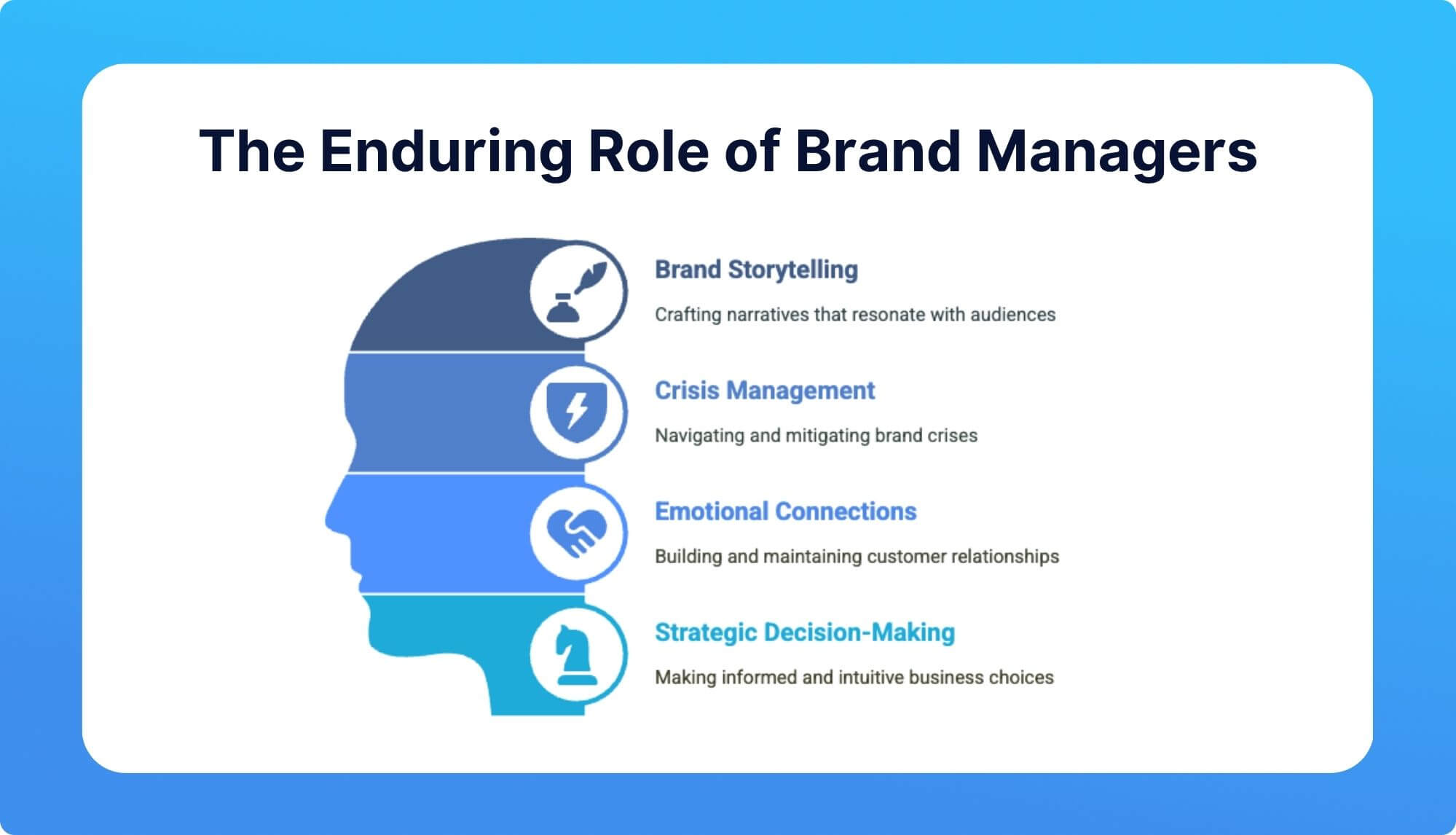Will AI Replace Brand Managers?
AI is transforming brand management—but human creativity and strategy still lead the way.
Table of contents

AI is transforming brand management—but human creativity and strategy still lead the way.
Brand managers have long played a critical role in shaping how companies are perceived, creating marketing strategies, and ensuring a consistent brand voice across all platforms. From crafting advertising campaigns to managing social media presence, brand managers are at the heart of how businesses connect with their audience.
But with the rise of artificial intelligence (AI) in marketing, many of these responsibilities are now being automated. AI can analyze customer data, generate marketing content, predict trends, and even optimize ad campaigns in real time.
So, will AI make brand managers obsolete? Or is there a future where humans and AI work together to redefine brand management?
The short answer: AI is changing the way brand managers work, but human creativity, strategic thinking, and emotional intelligence remain irreplaceable. The key is knowing how to leverage AI to enhance branding strategies rather than fear it.

Many businesses are integrating AI into their branding and marketing strategies. While AI is not "thinking" or "creative" in the way humans are, it is excellent at analyzing vast amounts of data, predicting trends, and automating repetitive tasks.
AI tools like ChatGPT, Jasper, and Copy.ai can generate blog posts, social media captions, product descriptions, and even ad copy in seconds. Instead of relying on human writers for every piece of content, brands are using AI to:
However, while AI can generate content, it lacks human creativity and storytelling skills, which are essential in crafting an authentic brand voice.
“While AI might not replace human creativity, it certainly can enhance it. AI tools offer new ways to approach content creation, from generating unique ideas to suggesting improvements in tone and style. By providing a fresh perspective, AI can inspire human creators to innovate and experiment with their content strategies.”
- Seth Silver, Executive Creative Director
Brand managers traditionally rely on surveys, focus groups, and market research reports to understand customer behavior. AI can now analyze customer data in real-time, offering deeper insights with:
These AI-driven insights help brand managers make data-backed decisions, but human interpretation is still required to shape strategies that align with business goals.
AI algorithms now power advertising platforms like Google Ads and Facebook Ads, automatically optimizing campaigns by:
This means brand managers no longer need to manually tweak every campaign, but they still need to set the brand direction, positioning, and messaging.
AI platforms can now identify influencers who align with a brand based on engagement rates, audience demographics, and previous campaign performance. AI tools are being used to:
AI is making influencer marketing more data-driven, but relationship-building with influencers still requires human effort.

AI is reshaping brand management, but it has clear limitations that prevent it from fully replacing human brand managers.
✔ Process massive amounts of customer data and provide real-time insights.
✔ Generate content quickly, reducing time spent on writing and scheduling.
✔ Automate ad targeting and campaign adjustments for better ROI.
✔ Monitor online brand sentiment and track customer perceptions.
❌ Develop a deep emotional connection with an audience. AI lacks human intuition and creativity, which are essential for crafting a compelling brand story.
❌ Make judgment calls in crisis situations. AI can detect negative sentiment, but it cannot make smart, empathetic decisions in public relations crises.
❌ Establish long-term brand vision and identity. AI can suggest design elements or colors based on data, but it cannot define a brand’s essence and unique positioning.
❌ Create culturally sensitive messaging. AI struggles with context, humor, and tone—what works in one market might be offensive in another.
While AI is an incredible assistant, it is not a strategic thinker or creative visionary—which are essential traits for a successful brand manager.

AI is automating many tasks that brand managers once did manually, but the role itself is not disappearing. Instead, it is evolving.
AI can assist brand managers, but it cannot lead and innovate the way humans can.

Instead of resisting AI, brand managers should embrace it as a tool that enhances their work. Here’s how:
Understanding how to use AI-driven platforms like:
Knowing how to work with AI will make brand managers more efficient and valuable.
Source: Amura Marketing Technologies
AI can process data, but it cannot replicate human creativity, emotional intelligence, or deep audience understanding. Brand managers should:
Brand managers who embrace No-Code and AI-powered marketing tools can transition into high-demand roles. Some alternative careers for brand managers include:
The future of branding isn’t about replacing humans with AI—it’s about combining AI’s efficiency with human creativity.
AI is changing brand management, but it is not replacing human brand managers. Instead, the role is shifting toward:
Brand managers who learn how to use AI effectively will work faster, make smarter decisions, and build stronger brands. Those who resist AI, on the other hand, may struggle as companies continue adopting automation.
The smartest move? Upskill now. Learning No-Code and AI-powered branding tools can open up new career opportunities in digital marketing, brand strategy, and customer experience design.
Looking to re-invent yourself and turn your talent into a career? Stay up to date with the latest.